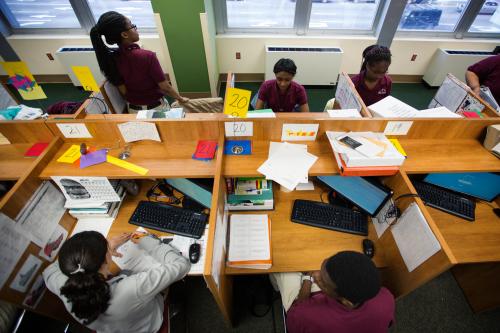This story was produced by The Hechinger Report, a nonprofit, independent news organization focused on inequality and innovation in education. Read more about education in New Orleans.
What does it say about Alabama schools that almost half of their former students voted for a bigoted, twice-expelled judge who has been accused by multiple women of sexual harassment, including pedophilia? How we behave as adults, and what we expect of those around us, has its roots in what we learned in the classroom. Clearly, we have a lot to learn about race and gender.
Racism and sexism are attitudes that are best addressed by schools as part of children’s overall development. Racist children become racist adults. The sexism that is shrugged off in schools can result in harassment in the workplace. The recent wave of blistering accounts from women about the sexual harassment and assault they have faced in their work not only exposes their abusers, it also reveals the grand failing of schools.
Racist children become racist adults. The sexism that is shrugged off in schools can result in harassment in the workplace.
It may start small. Every time a teacher calls on a boy to be in a leadership position without offering a similar opportunity to a girl, or laughs off sexist jokes or doesn’t intervene when someone is being bullied, or objectified, those students are absorbing that these behaviors are ok, that they are normal.
The ways in which state departments of education measure academic progress — primarily based on standardized tests that measure reading, math and science knowledge — don’t assess the social skills students need to become productive adults. Sure, we need students to master academics, but they should not come at the expense of social awareness and compassion. It’s painfully evident that educators must measure social and emotional skills too, and incorporate that assessment in our formulas for performance.
Standardized tests are horrible predictors of how children develop into adults. But we can look at adult behavior as a yardstick to measure what students need now to grow into socially responsible adults. Some of the “smartest” men in the world are supposedly afraid, in the Weinstein era, to take one-on-one meetings with women for fear they will be accused of harassment. Clearly boys can stand a lesson on how to meet with those who make up more than half the population.
In Alabama, a whopping 68 percent of white voters supported Republican candidate Roy Moore, who, upon being asked when was the last time America was “great,” replied, “I think it was great at the time when families were united — even though we had slavery — they cared for one another…. Our families were strong, our country had a direction.” Alabama can stand a remedial course in slavery and black history.
A whopping 98 percent of black women (17 percent of the electorate) cast ballots for Jones. Compare that to the 68 percent of white voters who supported Moore.
Votes are proof of our ability (or inability) to make sound judgments. All but 4 percent of African-Americans voted for the Democratic candidate, Doug Jones, and black voters accounted for roughly 30 percent of the Alabama electorate, according to a CNN exit poll. A whopping 98 percent of black women (17 percent of the electorate) cast ballots for Jones. Compare that to the 68 percent of white voters who supported Moore. Even the other sitting senator in the state, Republican Richard Shelby, said a write-in candidate was better than Moore. From the Alabama election, we can see that black people, especially black women, showed higher levels of discernment than their white peers.
Education departments and school districts take for granted the advanced skills that many black and brown students have. Chalking up voting behavior as purely a function of partisan politics and not a reflection of critical thinking is a mistake. The manifestation of logic can also be found in art, culture, business and religion. In only evaluating one measure of success, schools are failing their students.
Poor discernment also reflects a lack of exposure. Imagine the positive impact that integrated schools might have on white students who currently live in a bubble of white privilege. Diversity provides a check and balance system that can nip a nascent sense of entitlement in the bud and can generate deeper knowledge, empathy and trust.
Proponents of social and emotional learning (SEL) can help reframe what schools and colleges should expect students to learn. SEL refers to the development of skills to manage emotions, become self-aware and maintain positive relationships. It’s time to treat racism and sexism as indicators of school failure. SEL advocates can continue helping to knit together academic skills with social and emotional proficiencies.
Schools’ disciplinary programs are supposed to help their charges manage emotions, become self-aware and maintain positive relationships. If a kid hits his classmate in a fit of anger, teachers often resort to the go-to tool of suspension to show him that he should use his words, not his fists. But in practice, the imposition of harsh disciplinary practices is more of a projection of teachers’ bias than a strategy to redirect behavior.
Researchers in a 2016 Yale study found that teachers are prone to expect negative behaviors from black children more than their white peers. The study specifically found that preschool educators’ implicit biases contribute to uneven rates of suspension and expulsion disfavoring black children.
In its series on racial disparities in academic achievement (aka the achievement gap) in Alabama, news outlet AL.com reports that black students make up only 32 percent of enrollment statewide yet they account for 62 percent of all suspensions.
The framing of the achievement gap ignores critical competencies that every student must demonstrate, and it also doesn’t reward those who have exhibited proficiency.
The framing of the achievement gap ignores critical competencies that every student must demonstrate, and it also doesn’t reward those who have exhibited proficiency. This is where SEL advocates must show how schools can evaluate cross-cultural awareness and gender sensitivity. At the state, district and school level, we need curricula and programs that hold students to a high standard of appropriate social behavior — something that holds them accountable before they make it so close to Capitol Hill.
The Brookings Institution is committed to quality, independence, and impact.
We are supported by a diverse array of funders. In line with our values and policies, each Brookings publication represents the sole views of its author(s).







Commentary
Alabama proves that if schools don’t intervene, racist youth grow up to be racist adults
December 21, 2017